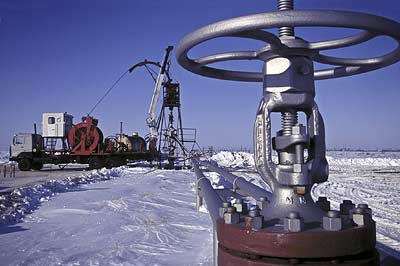Russian gas as political leverage?
 As I have sworn to report on the weekly Economist column Buttonwood I should better get started. This monday the column reports on the sudden gas shortage in Europe prompted by a dispute between Russia's newly
As I have sworn to report on the weekly Economist column Buttonwood I should better get started. This monday the column reports on the sudden gas shortage in Europe prompted by a dispute between Russia's newly privatised (nationalized!) state behemoth Gazprom and Ukraine over the cost of gas (good Wikipedia link!).
See the Buttonwood article here. (see also BBC article here.)
The obvious question is whether official Russian authorities still have something to say in the manoeverings of Gazprom. If so, this issue could be interpreted as a geopolitical muscle flexing from Russia's side. So far, the official Russian stance is that the dispute over the gas is purely commercial.
"Russia has insisted that the row between its giant energy firm, Gazprom, and Ukraine over gas prices is purely a commercial dispute with no underlying political motives. But that is not how it looks to some, especially now that Russia has carried out its threat to cut off supplies to Ukraine for failing to accept a sharp rise in prices."
Many European countries who have already seen their supply of Russian fall by as much as 30-40% see it otherwise though.
(...) the matter has certainly now become political. The German, Italian, French and Austrian energy ministers have made a joint appeal to Russia and Ukraine to keep the gas flowing, while the State Department in Washington said Russia's cut-off of supplies to Ukraine “raises serious questions about the use of energy to exert political pressure.
In think the article is right as it claims that Gazprom is entitled to claim higher prices from Ukraine because of the supply/demand dynamics, but there are two points pertaining to this argument which deserve mention.
1. A sudden priceraise from $50 to $230 per cubic meter is very harsh and it does smell of a political overtone. Furthermore, there is no doubt that Gazprom's massive gas ressources present Russia with a notable geopolitical leverage which it seems the country is using now. Price differentiation is not a new phenomenon in the supply of Russian gas but it gets a whole image with the stance towards Ukraine.
2. Why cut the pipes so swiftly and quickly? The reaction comes in a time where the European households are just beginning to heat up as the winter sets in. This Russian move thus cannot but inspire to fear and unrest and even if it is unwarranted this analysis surely cannot have escaped Russian policymakers.
Russia's hardball tactics might seem to yield respect for Russia in the short run, but this respect has a negative face and in the long run Europe and USA have a larger muscle to flex, but the coming winter may well be a cold one at least for large gas-hungry enterprises.
For more on this go see ...
This post by Edward Hugh at AFOE.
"prompted by a dispute between Russia's newly privatised state behemoth Gazprom"
Well well, it is the other way as you will also read in the post I have linked to! Gazprom essentially became stateowned NOT privatized.
I must admit that I really messed things up with my first post in 2006 ...
1. This is a mistake partly corrected by my first update. However, When I re-read my post I narrate it as if Gazprom is no longer on statehands ... this is not true; sorry for that. Once again read this post to get the real story of Gazprom and its state affiliation.
2. The article from The Economist is not a Buttonwood column but a Global agenda article!
I will redeem myself shortly ...